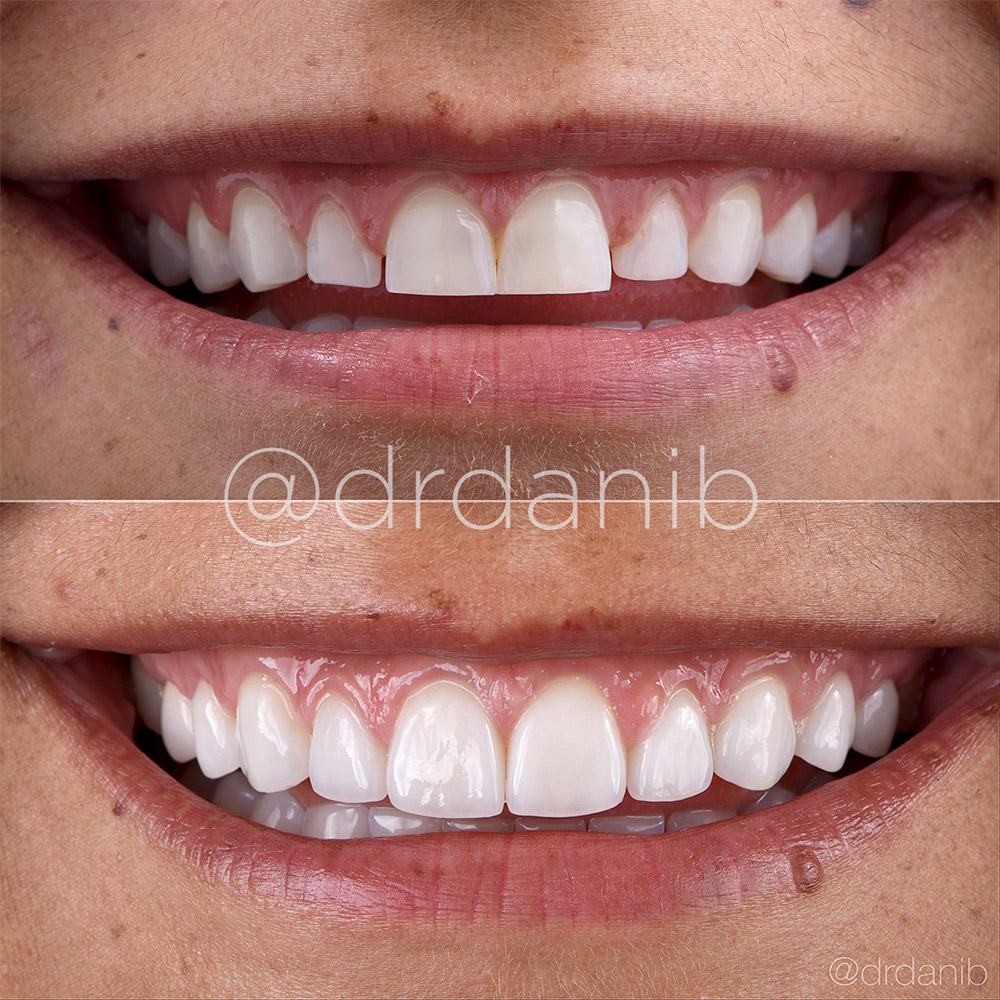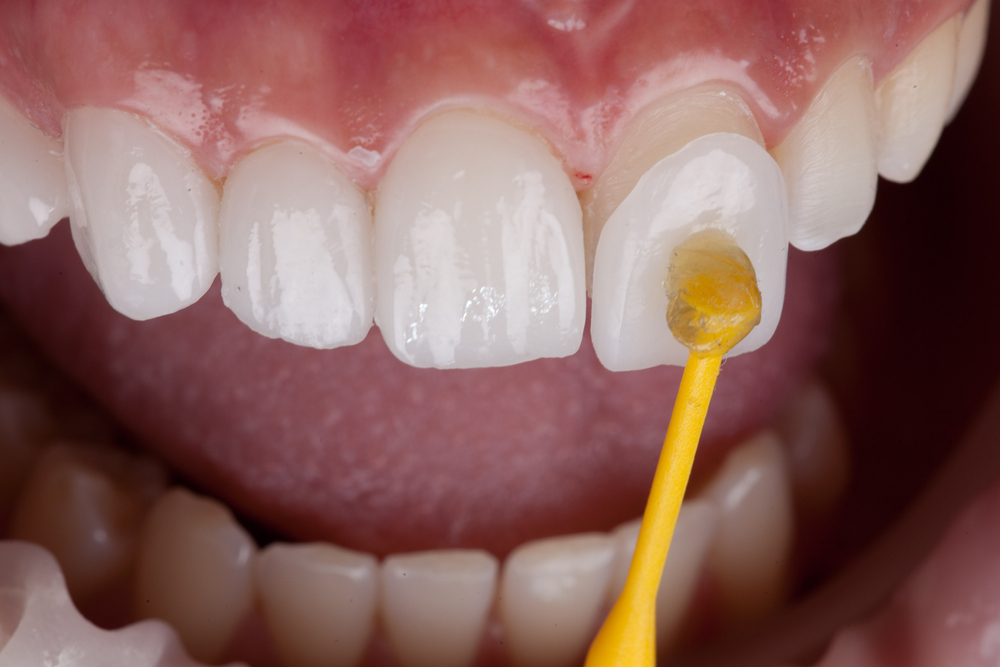How Dental Veneers Can Correct Imperfections Like Gaps and Chips
Opening the Keys of Veneers: Realities, Types, and Benefits for an Attractive Smile
Veneers use a compelling solution for those seeking to enhance their smiles. These oral enhancements can attend to various blemishes, from staining to imbalance. With alternatives like porcelain and composite, people can choose based on their requirements and choices. Nonetheless, understanding the nuances of veneers, consisting of application and care, is essential. What factors should one take into consideration prior to deciding? The answers might shock those thinking about this visual dental alternative.

Recognizing Veneers: What Are They?
Veneers are slim, customized shells made to cover the front surface of teeth, enhancing their appearance. Typically crafted from durable materials, these shells are customized to fit each person's teeth specifically. They serve numerous purposes, consisting of remedying aesthetic blemishes such as staining, chips, or voids. The application process involves a dental professional preparing the teeth, usually by eliminating a percentage of enamel to assure a tight fit. When prepared, the veneers are bonded to the teeth utilizing a strong adhesive.
Individuals commonly choose veneers for their capability to create a natural-looking smile while providing a durable solution to dental flaws. Unlike other aesthetic dental care alternatives, veneers require very little invasive treatments, making them a popular option. The result is an enhanced smile that can substantially boost an individual's confidence and self-confidence. In general, veneers offer an effective method to accomplishing an extra appealing and harmonious dental appearance.
Kinds of Veneers: Porcelain vs. Composite
When thinking about cosmetic dental alternatives, two main types of veneers stand out: porcelain and compound. Porcelain veneers are crafted from a durable ceramic product that simulates the natural appearance of teeth. They are understood for their tarnish resistance and capability to mirror light in a similar way to all-natural enamel, giving an aesthetic charm that lots of people need. The application procedure generally involves even more prep work of the tooth framework and may call for multiple sees to the dental expert.
On the various other hand, composite veneers are made from a tooth-colored resin that is directly applied to the teeth. This type permits for quicker application and can often be completed in a solitary check out. While they are cheaper than porcelain veneers, they might not supply the same longevity or resistance to staining. Ultimately, the option between porcelain and composite veneers relies on individual choices, spending plan, and specific dental requirements.
The Advantages of Deciding On Veneers
Choosing veneers uses numerous benefits that can substantially improve both the aesthetic appeals and performance of an individual's smile. One of the key benefits is their ability to deal with flaws such as staining, spaces, and misalignment, causing a much more consistent appearance. Veneers can additionally enhance the resilience of teeth, giving a protective layer that guards them from damages.
They need minimal tooth preparation compared to other dental procedures, protecting even more of the all-natural tooth structure. This preservation adds to a healthier dental setting while still achieving a magnificent smile.
Veneers are very customizable, allowing people to pick the shape, dimension, and color that finest matches their preferences. Furthermore, they are stain-resistant, making it much easier to maintain a eye-catching and bright smile gradually. Overall, veneers offer a reliable choice for those looking for both cosmetic enhancement and long-lasting oral health and wellness benefits.
The Veneer Application Process
The veneer application process involves numerous essential steps to ensure optimal outcomes. At first, a consultation is performed to examine the person's demands, followed by the preparation and shaping of the teeth. The veneers are adhered in place, with modifications made for a best fit and appearance.
Preliminary Consultation Tips
A complete preliminary assessment is important for any person taking into consideration veneers, as it establishes the structure for an effective treatment. During this conference, the dental expert assesses the person's oral wellness, reviewing any kind of existing problems that could impact the veneer application. This evaluation may include X-rays and an aesthetic evaluation to figure out the condition of the gum tissues and teeth.
The dental expert also engages the individual in a comprehensive discussion regarding their aesthetic goals, preferences, and assumptions. They might provide various veneer alternatives tailored to the person's details needs. In addition, the professional discusses the procedure, possible dangers, and aftercare demands, making certain that the individual is knowledgeable and comfy prior to waging the therapy.
Preparation and Forming Teeth
After the first examination, the following phase includes the prep work and shaping of the teeth to fit the veneers. This crucial action is carried out by the dental practitioner, that meticulously evaluates the tooth structure to determine the amount of enamel that needs to be eliminated. Typically, a slim layer, usually around 0.5 millimeters, is shaved off to ensure a proper suitable for the veneers. Accuracy is extremely important during this process, as it impacts both the general convenience and the aesthetic outcome. Once the teeth are appropriately shaped, perceptions are required to create custom-made veneers that line up completely with the individual's oral profile. This precise preparation sets the stage for an effective veneer application, enhancing both look and feature.
Bonding and Last Adjustments
Adhering to the shaping and prep work of the teeth, the bonding process begins, noting an essential stage in the veneer application. During this stage, an oral adhesive is put on the ready tooth surface, ensuring a solid bond in between the tooth and the veneer. The dental expert thoroughly positions the veneer, making adjustments Find Out More to accomplish the preferred alignment and visual appeals. As soon as appropriately positioned, a special light is made use of to heal the adhesive, strengthening the bond. After healing, the dental expert conducts final changes, cutting any kind of excess material and refining the veneer's shape to guarantee a natural appearance. This mindful focus to detail improves both feature and visual appeals, adding to a general stunning smile that is durable and long lasting.
Caring for Your Veneers: Upkeep Tips
Caring for veneers is crucial to preserve their appearance and long life. A regular day-to-day cleaning routine, conscious avoidance of tarnishing foods, and routine oral check-ups are essential parts of effective upkeep. These methods aid guarantee that veneers remain in peak condition and remain to improve one's smile.
Daily Cleaning Routine
Consistently maintaining veneers is vital for their longevity and look. A proper everyday cleaning routine can help preserve their luster and prevent damage. Dental experts suggest cleaning twice a day with a soft-bristled tooth brush and fluoride toothpaste, ensuring that all surfaces are cleansed carefully to stay clear of scraping the veneer surface area. Flossing daily is also vital to get rid of food particles and plaque from between teeth, where brushes may not get to. Additionally, using an antimicrobial mouthwash can aid preserve dental hygiene without hurting the veneers. It is advisable to prevent unpleasant cleaners and devices that can damage the veneer. By complying with these straightforward steps, individuals can keep their veneers looking beautiful while promoting general oral health.
Staying Clear Of Staining Foods
Although veneers are created to boost the look of teeth, their vulnerability to tarnishing requires cautious dietary choices. It is crucial for individuals with veneers to be mindful of certain foods and beverages that can bring about discoloration. Dark-colored items such as coffee, red wine, and berry juices must be eaten in moderation, as they are understood to discolor both natural teeth and veneers. Additionally, acidic foods like citrus fruits canister weaken the bonding representatives utilized in veneers, making them much more prone to staining. To preserve an intense smile, it is recommended to rinse the mouth with water after taking in discoloration foods and to exercise routine dental hygiene. These thoughtful choices add considerably to the durability and aesthetics of veneers.

Normal Oral Examinations

Keeping the integrity of veneers requires a commitment to normal oral exams, as these consultations play a crucial role in ensuring their durability and look. During these gos to, oral professionals can assess the condition of the veneers, looking for any type of indications of wear, damage, or underlying dental issues. In addition, regular cleanings assist remove plaque and tartar that can build up around the veneers, advertising total dental health and wellness. Dental practitioners can also give tailored recommendations on care methods and items suited for veneer upkeep. By sticking to a routine of exams, individuals can deal with potential troubles early, guaranteeing their smile remains beautiful and dynamic. Ultimately, regular dental sees are a vital element of veneer treatment.
Is Veneers the Right Alternative for You?
Determining whether veneers are the right choice commonly pivots on specific aesthetic objectives and dental demands. For those seeking to deal with issues such as discoloration, chips, or misalignment, veneers can give a transformative service. Prospects commonly include individuals with healthy and balanced teeth but desire an enhanced smile.
It is important to take right into account elements such as tooth enamel problem, the degree of dental concerns, and the willingness to maintain veneers. Consulting with a dental specialist is crucial, as they can evaluate dental health and identify if veneers appropriate
In addition, possible candidates should show on the lasting commitment, as veneers might need replacement every 10-15 years. Expense considerations also play a considerable function, as veneers can be a significant investment. Eventually, the choice needs to be educated, stabilizing aesthetic needs with practical factors to consider for long lasting results.
Frequently Asked Questions
How Much Time Do Veneers Commonly Last Prior To Needing Replacement?
Veneers usually last between 10 to 15 years before needing substitute. Elements such as dental hygiene, lifestyle selections, and material high quality can affect their long life, making normal oral exams necessary for keeping their problem.
Are Veneers Safe for Individuals With Sensitive Teeth?
Veneers can be secure for individuals with delicate teeth, yet it often depends upon the seriousness of sensitivity right here and the dental professional's strategy. Consulting an oral professional prior to continuing is important to assure ideal end results.
Can Veneers Be Eliminated or Replaced Conveniently?

Do Veneers Stain Over Time, and Exactly How Can I Avoid It?
Veneers can stain with time, particularly from foods and beverages like coffee or merlot. To avoid staining, maintaining excellent dental hygiene, making use of a straw for beverages, and routine dental cleansings are advised techniques.
What Is the Price Array for Obtaining Veneers?
The price of veneers generally ranges from $500 to $2,500 per tooth, relying on elements such as product kind, dentist experience, and area. Individuals should consult with oral professionals for personalized quotes and financing alternatives.
As soon as the teeth are sufficiently formed, perceptions are taken to create custom veneers that line up completely with the client's dental profile. Throughout this phase, an oral adhesive is used to the ready tooth surface area, ensuring a strong bond in between the tooth and the veneer. It is crucial to take into account variables such as tooth enamel problem, the extent of dental issues, and the willingness to maintain veneers. Veneers can be risk-free for individuals with delicate teeth, yet it typically depends on the severity of sensitivity and the dental expert's technique. The cost of veneers normally ranges from $500 to $2,500 per tooth, depending on aspects such as product type, dentist experience, and location.